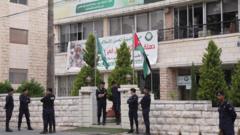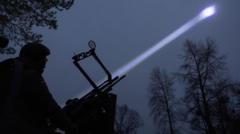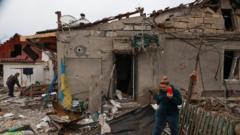Jordan's Interior Minister Mazen al-Faraya announced the government's ban on the Muslim Brotherhood, stating that the group's activities will now be considered illegal. This move follows the arrest of 16 individuals suspected of planning rocket and drone attacks aimed at destabilizing national security. Police raids on the Brotherhood's offices, including the Islamic Action Front, have raised questions about the future of its political presence, as the group denies any involvement in the alleged plots. The Brotherhood has faced scrutiny in the region, often viewed as a security threat by various governments.
Jordan Bans Muslim Brotherhood Amid Allegations of Attack Plots

Jordan Bans Muslim Brotherhood Amid Allegations of Attack Plots
Jordan's government takes decisive action against the Muslim Brotherhood following arrests linked to planned attacks.
On Wednesday, Jordan's government officially announced a ban on the Muslim Brotherhood, marking a significant escalation in its ongoing efforts to curb the organization. The ban comes in the wake of recent arrests made by the country's General Intelligence Department, which detained 16 individuals linked to accusations of planning rocket and drone attacks. According to Interior Minister Mazen al-Faraya, these groups were allegedly plotting to target national security and incite chaos within Jordan.
Faraya confirmed that the government's actions would include the closure of all of the Brotherhood's offices, the confiscation of its assets, and the classification of any such activities as illegal. The government's crackdown appears to primarily target the Brotherhood's political branch, the Islamic Action Front (IAF), which operates as the largest opposition faction within the parliament. Following the announcement, police conducted raids on the IAF’s headquarters, raising concerns about the group's operational future.
The IAF's secretary general, Wael Saqqa, responded by maintaining that the party operates independently and is committed to adhering to the laws and constitutional guidelines of Jordan. He emphasized the IAF's constitutional role, underscoring its separation from alleged extremist activities linked to the larger Brotherhood organization.
Despite a ruling from Jordan's top court in 2020 that declared the Brotherhood "dissolved" due to legal irregularities, the group has continued to participate in political activities, including last year's parliamentary elections, where it secured 31 seats out of 138.
In regard to the recent arrests, the General Intelligence Department cited serious concerns about the alleged activities of the individuals, which included possession of explosives, plans to manufacture rockets, and a project aimed at creating drones. Minister Faraya claimed that some Brotherhood members had attempted to eradicate documents from their headquarters to cover up their involvement in these plots.
The Muslim Brotherhood has a long history, having originated in Egypt nearly a century ago, and is known for advocating for the establishment of a state governed by Islamic law, or Sharia. The organization is currently outlawed in multiple Arab states, with various governments viewing it as a significant security threat. This latest development in Jordan reflects the ongoing tensions surrounding the Brotherhood and its perceived influence across the Middle East.
Faraya confirmed that the government's actions would include the closure of all of the Brotherhood's offices, the confiscation of its assets, and the classification of any such activities as illegal. The government's crackdown appears to primarily target the Brotherhood's political branch, the Islamic Action Front (IAF), which operates as the largest opposition faction within the parliament. Following the announcement, police conducted raids on the IAF’s headquarters, raising concerns about the group's operational future.
The IAF's secretary general, Wael Saqqa, responded by maintaining that the party operates independently and is committed to adhering to the laws and constitutional guidelines of Jordan. He emphasized the IAF's constitutional role, underscoring its separation from alleged extremist activities linked to the larger Brotherhood organization.
Despite a ruling from Jordan's top court in 2020 that declared the Brotherhood "dissolved" due to legal irregularities, the group has continued to participate in political activities, including last year's parliamentary elections, where it secured 31 seats out of 138.
In regard to the recent arrests, the General Intelligence Department cited serious concerns about the alleged activities of the individuals, which included possession of explosives, plans to manufacture rockets, and a project aimed at creating drones. Minister Faraya claimed that some Brotherhood members had attempted to eradicate documents from their headquarters to cover up their involvement in these plots.
The Muslim Brotherhood has a long history, having originated in Egypt nearly a century ago, and is known for advocating for the establishment of a state governed by Islamic law, or Sharia. The organization is currently outlawed in multiple Arab states, with various governments viewing it as a significant security threat. This latest development in Jordan reflects the ongoing tensions surrounding the Brotherhood and its perceived influence across the Middle East.




















